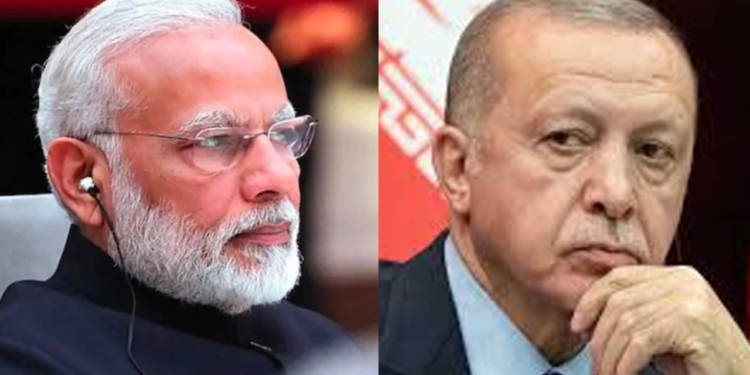The anti-India rhetoric by the President of Turkey Recep Tayyip Erdogan at the 74th session of the UNGA has certainly not gone down well the Indian administration, which seems to have initiated proactive steps to counter Turkey’s interference in India’s internal matters and its open support to terror sponsoring regime in Pakistan.
According to recent reports, an FSS project with an estimated cost of $2.3 billion which was been undertaken by Hindustan Shipyard Limited (HSL) in collaboration with Turkish M/s Anadolu Shipyard is expected to be put on a hold.
“The contract for the 45,000-ton fleet support ships (FSS) for the Indian Navy with the Turkish Company could be delayed….It could be a fall out of Turkey cosying up to Pakistan and raising Kashmir issue at the recently concluded 74th United Nations General Assembly (UNGA),” an Officer told Financial Express Online.
The comments by Turkish President Recep Tayyip Erdogan supporting Pakistan’s pro-terror agenda were met with sharp criticism in India. During his speech, Erdogan had raised the Kashmir issue in support of Pakistan’s attempts to churn dissension around legislative developments in the region.
It must be noted that while the international community has largely sided with India’s efforts to counter-terror and provide good-governance in the regions of Jammu, Kashmir and Laddakh, a handful of rouge elements like Turkey and Malaysia have come out in support of pro-terror regime in Islamabad. During his speech, Erdogan had said, “Despite the resolutions adopted, Kashmir is still besieged and eight million people are stuck in Kashmir.” He also went on to criticise the international community for not paying sufficient attention to the issue of Kashmir.
He had added, “In order for the Kashmiri people to look at a safe future together with their Pakistani and Indian neighbours, it is imperative to solve the problem through dialogue and on the basis of justice and equity, but not through collision.”
However, now with the $2.3 billion project with Turkey under the scanner of Indian administration, it is sure to hurt the Turkish economic interests. Nonetheless, change in India’s stance towards Turkey has been evident since the 74th session of the UNGA itself, where the Indian Prime Minister had met the Armenia PM Nikol Pashinyan and Cyprus President Nicos Anastasiades on the side-lines. By holding top-level meetings with Cyprus and Armenia, countries which have been wronged by Turkey in the past, India had also sent across a strong message to the Turkish President, Erdogan.
Armenia shares a long history of strained relations with Turkey and Armenians still accuse Turkey of having committed an inhuman massacre of the Armenian population in the early twentieth century. Turkey is also accused of having played down the mass killings at that time. Cyprus, on the other hand, was violently partitioned by Turkey in 1974, after an invasion, which ultimately led to the Turkish occupation of a major part of Cyprus by the end of the invasion. More recently, Turkey has been trying to occupy parts of what is left of Cyprus and has been at odds with Greece for this reason.
Though bilateral trade between India and Turkey had been on a downtrend and declined by 28% to $4.91 billion in 2015-16, the two sides had agreed to boost trade to at least $10 billion by 2020. As India remains Turkey’s second largest trading partner in Asia pacific, several Turkish companies have been heavily involved in business in India, the Celebi Aviation Company which has bagged massive contracts to run India’s airports. Nonetheless, with recent developments India has clearly indicated that any agenda detrimental to India’s strategic and national interest will not be tolerated and for Turkey, sent a clear message to get rid of its offensive and hypocritical behaviour displayed during the UN General Assembly session.
























